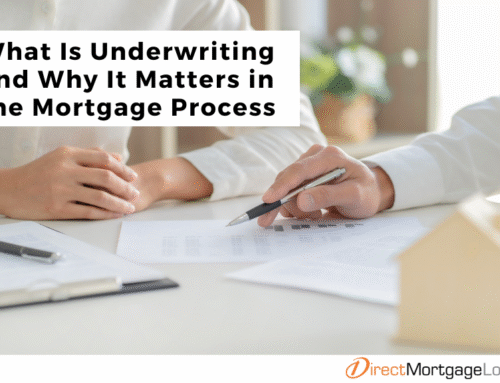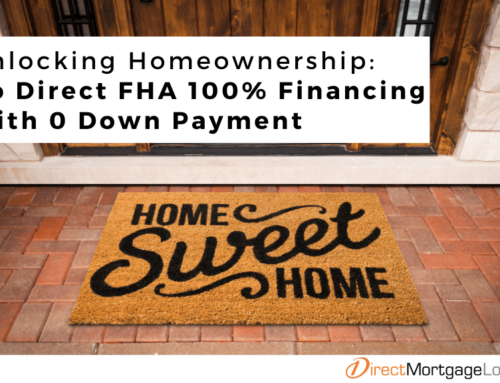FHA loans are a popular choice for homebuyers looking for a low down payment option with flexible credit requirements. However, if you already have an FHA loan and are considering purchasing another home, you may be wondering—can you have more than one FHA loan at a time? The general rule is that FHA loans are designed for primary residences, meaning most borrowers can only have one active FHA loan at a time.
However, life is unpredictable, and there are certain situations where the Federal Housing Administration (FHA) allows borrowers to take out a second FHA loan. In this guide, we’ll explore the circumstances under which you may qualify for multiple FHA loans, the requirements involved, and alternative mortgage options if a second FHA loan isn’t possible.
Subscribe to our blog to receive notifications of posts that interest you!
Can you have two FHA loans at the same time?
FHA loans are generally limited to one active loan at a time, as they are intended to help individuals finance their primary residence. This rule is in place to ensure the program serves homebuyers who need housing—not those looking to purchase multiple properties.
However, the FHA does allow exceptions under specific circumstances. While rare, it is possible to have two FHA loans at the same time if you meet certain eligibility conditions and can clearly demonstrate a valid reason for needing a second primary residence. These exceptions are carefully reviewed, and borrowers must work with an FHA-approved lender to determine if their situation qualifies.
In short, yes—it’s possible to have two FHA loans at once, but only under very specific, approved situations.
When can you get a second FHA Loan?
If you already have an FHA loan but need to purchase another home due to specific life changes, you may be eligible for a second FHA loan under the following conditions:
Relocation Due to Job Change
If your job requires you to move to a new location that is beyond a reasonable commuting distance, you may qualify for a second FHA loan. Since FHA loans are intended for primary residences, the agency recognizes that maintaining your original home may not be feasible in this scenario.
Family Size Increase
If your household size has significantly increased, and your current home no longer accommodates your family’s needs, you may be eligible for another FHA loan. You will need to provide documentation proving that your existing home is too small to meet your growing family’s requirements.
Co-Borrower Situations
If you originally co-signed an FHA loan for a family member and now wish to purchase a home for yourself, you may be eligible for a second FHA loan. The FHA acknowledges that in co-borrower situations, the original home is intended as the primary residence of the other borrower, allowing you to obtain an FHA loan for your own home.
Divorce
If you were awarded an FHA-financed property in a divorce settlement or had to leave a jointly-owned home, you might be eligible for another FHA loan. In such cases, legal documentation of the divorce and property transfer is required to support your application.
You can learn more about the special circumstances around obtaining two FHA loans by speaking with a knowledgeable expert at Direct Mortgage Loans.
How can you qualify for multiple FHA loans?
To be eligible for more than one FHA loan, you must meet standard FHA loan qualifications, which include:
FHA Loan Qualifications
- Credit Score Requirements: A minimum credit score of 580 is typically required to qualify for a 3.5% down payment. Some lenders may have stricter requirements. Reach out to a Direct Mortgage Loans loan expert today to find out the specific requirements for your next loan.
- Debt-to-Income Ratio: Generally, lenders prefer a debt-to-income ratio (DTI) below 43%, though some may allow higher ratios with compensating factors.
- Down Payment: Borrowers with a credit score of 580 or higher must make a minimum down payment of 3.5%.
Additionally, you must demonstrate eligibility for an FHA exception to obtain a second loan. Documentation supporting your need for another FHA loan, such as proof of job relocation or family size increase, will be necessary.
Alternative Mortgage Solutions to Multiple FHA Loans
If you find that you’re not eligible for a second FHA loan—or if you’d prefer a different type of financing—there are several other mortgage options worth considering. Whether you’re planning to purchase a second home, upgrade your living situation, or invest in real estate, alternative loan programs may offer the flexibility you need.
These alternatives vary in terms of requirements, benefits, and intended use, but they can be especially helpful if your situation falls outside of FHA guidelines. Depending on your financial profile and the purpose of your new purchase, a conventional loan, VA loan, USDA loan, or DSCR loan could be a better fit.
Let’s take a look at each of these options and how they might work in place of a second FHA loan:
Conventional Loan
A conventional loan may be a great alternative if you no longer qualify for an FHA loan. These loans are not government-backed, often requiring a higher credit score and a larger down payment. However, they provide more flexibility for borrowers who need to finance multiple properties.
VA Loan
If you are a veteran, active-duty service member, or eligible spouse, you might qualify for a VA loan. VA loans offer several benefits, including no down payment and no private mortgage insurance. Additionally, you may be able to have multiple VA loans simultaneously if you meet entitlement and occupancy requirements.
USDA Loan
A USDA loan is an option for borrowers purchasing a home in an eligible rural area. These loans offer benefits like zero down payment. However, USDA loans are only available for primary residences. Speak to a loan professional to understand if this loan may be right for you.
DSCR Loan
For real estate investors, a Debt Service Coverage Ratio (DSCR) loan may be an excellent alternative. Unlike traditional loans, DSCR loans focus on a property’s income potential rather than a borrower’s personal income, making them ideal for those looking to finance multiple investment properties.






Leave A Comment
You must be logged in to post a comment.